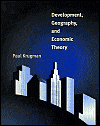|

From the Publisher
Krugman examines the course of economic geography and development theory to shed light on the nature of economic inquiry. He traces how development theory lost its initial influence after it became clear that many of the theory's main insights could not be clearly modeled, and concludes with a commentary on areas where further inquiry looks most promising.
Excerpts
A friend of mine who combines a professional interest in Africa with a hobby of collecting antique maps has written a fascinating paper on what he calls “the evolution of ignorance” about Africa. The paper describes how European maps of the African continent evolved from the fifteenth to the nineteenth centuries. You might have supposed that the process would have been more or less linear (…) But that’s not what happened.
The improvement in the art of mapmaking raised the standard for what was considered valid data. (..) But there was an extended period in which improved technique actually led to some loss in knowledge.
The economic theorist is in possession of information about the economy-some of it hard data, the equivalent of the work of men with sextants, some of it anecdotal, the equivalent of travelers’ tale. From this mixture of reliable and unreliable evidence, plus a priori beliefs that are used not only to fill in where evidence is lacking but also in some cases to overrule the apparent evidence, the theorist attempts to pput together a picture of how the economy works.
I want to take a look at a largely parallel story that nonetheless lets us see things from a different perspective: the failure of economics to take account of space.
And the response of the geological profession was a remarkable, although typical one: virtually to ignore, even to deny the existence of, question that it was no prepared to answer.
Like geologists who could not really look at where mountain ranges are located because they knew they had no model of mountain formation, economists avoided looking at the spatial aspect of economies because they knew they had no way to model that aspect.
I want to do for spatial economics the same thing I did for development economics in the last lecture: use a biased set of references to argue that there was a set of core ideas that make considerable sense in light of recent economic analysis, but that were unacceptable to mainstream economics because they could not at that time be modeled.
And for those, like me, who basically try to understand the world trough the metaphors provided by models, the advice is not to let important ideas slip just because they haven’t been formulated your way.
|